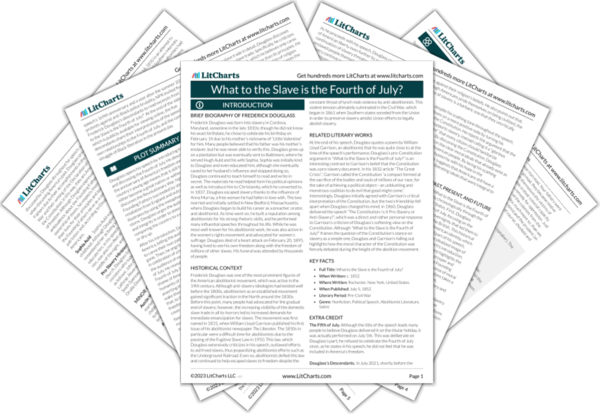“What to the Slave is the Fourth of July?” is a speech patterned off of typical sermons of the day, complete with a multitude of references to biblical passages that support Douglass’s logic from a Christian perspective. This approach to his speech gives Douglass significant moral and religious standing to criticize the American church, which he does at length in the middle part of the speech. Douglass’s condemnation of the church, which largely supported slavery at the time, is unapologetically scathing. To Douglass, the pro-slavery stance of the American church is so blasphemous that he views atheism as preferable—an extremely controversial statement to make in the heavily Christian society of 19th-century America, and an especially strong one to come from Douglass in particular, who was steadfast in his Christian faith. From Douglass’s perspective, however, such a statement poses no threat to his faith, since pro-slavery institutional Christianity is antithetical to his Christian ideals, which focus on bettering the world via freeing the weak and vulnerable from their oppressors. Douglass further indicts American Christianity by contrasting it with the British church, which supported efforts to free West Indian slaves. This, Douglass argues, is proof that the American church’s pro-slavery stance is a choice rather than an inevitability, and that Christianity can and should be used to fight oppression. In this way, Douglass argues that there is a dichotomy between the oppressive false Christianity of the American church and the liberatory faith of Christian abolitionists, to the extent that they are two different religions.
Christianity and the American Church ThemeTracker

Christianity and the American Church Quotes in What to the Slave is the Fourth of July?
The fact that the church of our country, (with fractional exceptions), does not esteem “the Fugitive Slave Law” as a declaration of war against religious liberty, implies that that church regards religion simply as a form of worship, an empty ceremony, and not a vital principle, requiring active benevolence, justice, love and good will towards man. … A worship that can be conducted by persons who refuse to give shelter to the houseless, to give bread to the hungry, clothing to the naked, and who enjoin obedience to a law forbidding these acts of mercy, is a curse, not a blessing to mankind.
Let the religious press, the pulpit, the Sunday school, the conference meeting, the great ecclesiastical, missionary, Bible and tract associations of the land array their immense powers against slavery and slave-holding; and the whole system of crime and blood would be scattered to the winds; and that they do not do this involves them in the most awful responsibility of which the mind can conceive.
For my part, I would say, welcome infidelity! welcome atheism! welcome anything! in preference to the gospel, as preached by those Divines! They convert the very name of religion into an engine of tyranny, and barbarous cruelty, and serve to confirm more infidels, in this age, than all the infidel writings of Thomas Paine, Voltaire, and Bolingbroke, put together, have done!
In prosecuting the anti-slavery enterprise, we have been asked to spare the church, to spare the ministry, but how, we ask, could such a thing be done? We are met on the threshold of our efforts for the redemption of the slave, by the church and ministry of the country, in battle arrayed against us; and we are compelled to fight or flee.
[In England], the church, true to its mission of ameliorating, elevating, and improving the condition of mankind, came forward promptly, bound up the wounds of the West Indian slave, and restored him to his liberty. There, the question of emancipation was a high[ly] religious question. … The anti-slavery movement there was not an anti-church movement, for the reason that the church took its full share in prosecuting the movement: and the anti-slavery movement in this country will cease to be an anti-church movement, when the church of this country shall assume a favorable, instead of a hostile position towards that movement.











